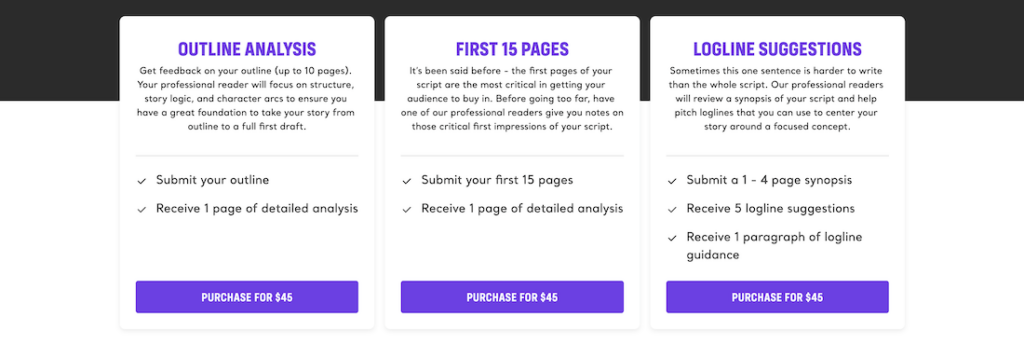Script coverage is an essential part of the film and television industry — and the grading system within that script coverage can make or break a script’s chance of being sold and produced.
The script coverage process entails a professional script reader/story analyst or professional script consultant (by way of a script consulting service) reading a script and providing a detailed analysis of its strengths, weaknesses, and market potential.
Script readers, story analysts, and script consultants will evaluate the script’s story, characters, dialogue, structure, themes, and marketability. They will also provide suggestions for revisions and offer an overall recommendation on whether the script is worth the time, money, and efforts of development executives, producers, managers, and agents — or whether or not it is ready to be submitted to them by screenwriters for those considerations. That recommendation is communicated within script coverage through three specific ratings that have been used in film and television script analysis and filtration for decades, providing a clear evaluation of a screenplay’s quality and worth.
Here we will delve a bit deeper into this grading system and what each grade means for you, the screenwriter, and also for studios, networks, streamers, management companies, and agencies.
Want to take your script to the next level? Check out ScreenCraft’s Genre-Specific Notes!
Script Coverage Ratings
The grading system for screenplay coverage is simple:
- Pass
- Consider
- Recommend
Each grade is meant to give an overview of the script’s quality and its potential for success. But remember, there are two types of script coverage that are written.
Read More: Script Coverage, Notes and Feedback: What’s the Difference?
Internal Entertainment Company Script Coverage
This is the type of script coverage written for the purpose of internal evaluation of screenplay submissions from:
- Screenwriters via solicited submissions
- Agents and managers representing their screenwriter clients and their scripts
The script coverage is written by script readers/story analysts, and sometimes specific script consultants hired by companies for their excellent, informative, and wise analysis.

Internal company script coverage isn’t shared with the screenwriters unless the screenwriter has a personal or professional networking connection that allows it to be shared. It is meant primarily for internal evaluation and will cover not just the basic breakdowns of concept, story, characters, plot, structure, and themes, but also whether or not the script falls in line with company needs, wants, and production plans.
Production companies, agents, and managers also offer script coverage to their clients to help them evaluate their work and identify potential investment opportunities.
Script Coverage Consulting Services for Screenwriters
Coverage services are companies that specialize in providing screenplay coverage to writers. They typically offer different levels of coverage, from basic notes to more detailed analyses.
The script coverage is provided by professional script consultants that usually have an extensive background in film and television development. These grades are subjective and depend on the reader’s opinion, but they provide a similar standardized system for evaluation that film, television, and streamer companies provide.
One of the main benefits of paying for professional screenplay coverage is that it provides screenwriters with constructive feedback on their work. This feedback can be incredibly valuable for screenwriters, as it can help them identify areas where they need to improve and develop their skills. It can also help screenwriters understand what industry professionals are looking for in a script and how to make their work more marketable.
Read More: Explaining All the Different Types of Script Coverage

What Are the Meanings of Script Coverage Ratings?
Pass, Consider, and Recommend — three words that can make or break the success of a screenplay in the Hollywood system. Beyond the detailed analysis of story, characters, dialogue, structure, and marketability of the screenplay covered in script coverage, these final ratings will decide what happens with the screenplay.
While professional script coverage offered through a script consulting service — or even through the voting evaluation process of screenwriting contests and fellowships — doesn’t necessarily dictate whether a script will be optioned, purchased, or produced, the ratings given can offer screenwriters an industry-level context, communicating whether or not a script is ready to be submitted to Hollywood companies.
Script coverage, and the ratings each script is given, are part of the necessary filtration process in the Hollywood studio, network, and streamer system, as well as the screenwriting contest system where contest readers are tasked with choosing quarterfinalists, semifinalists, finalists, and winners.
But what do these ratings mean?
Got a great feature? Enter it into the ScreenCraft Feature Screenplay Competition!
Pass
For internal company script coverage, a pass grade means that the reader does not think the script is ready for production or investment. The script may have significant flaws or may not be a good fit for the current market. Another determination is whether or not it fits into the company’s plans and branding for future production.

In script consulting coverage purchased by screenwriters, this grade can be disheartening for the screenwriter, but it is essential to remember that it is just one person’s opinion. A pass grade does not necessarily mean the end of the road for the script. It can be an opportunity for the writer to revise and improve their work.
There could be any number of major flaws or issues with the script that cause a reader to rate the script as a pass.
- Flawed structure
- Lacking character development
- Weak story
- Inconsistent plotting
- Poor pacing
- Wooden dialogue
- Low marketability
And it’s usually a combination of many such flaws and issues.
Consider
A consider grade is a more positive evaluation of the script. The reader believes the script has potential and could be worth investing in. Or, at the very least, it is worth passing up the ladder of a company for higher-level executives to consider it.
However, there may be some flaws or issues that need to be addressed before the script can be greenlit for acquisition, production, or advancement.
In screenwriting contests, a consider grade can be encouraging for the writer, as it shows that their work has potential. In the Hollywood system for script submissions, it means that each considered script has added life for potential options, acquisitions, and greenlights for production.
Beyond the ins and outs of story, character, and overall writing of the script, a reader can deem a project worthy of consideration for added interests of the genre, a compelling concept, particular strong characters within the script, and even for the writing itself as a great sample that proves the worth of the screenwriter for future potential assignments.
Recommend
A recommend grade is the highest evaluation a screenplay can receive, and because of that, it’s also the most difficult to achieve. Script readers/story analysts don’t give screenplays recommend ratings that much because there’s a high risk to lose the trust of their executive bosses.

In the Hollywood system, giving a script a recommend rating means the reader believes that the script is ready for production, investment of millions, and has the potential for success. Thus, those writing the internal script coverage won’t assign recommend grades lightly.
With professional script coverage provided by a consulting service for paying screenwriters, a recommend is offered a bit more than within the Hollywood system — but it is still a badge of honor for the screenwriter and their script. It means the reader believes that the script is ready for submission to Hollywood companies and that their work is seen as high quality and marketable.
In script coverage reports, each grade is typically accompanied by a detailed analysis of the script’s strengths and weaknesses, helping development executives, producers, agents, and managers understand the context of the rating that has been given.
For professional script consulting coverage, this analysis can help the writer understand why they received a certain grade and what they can do to improve their script.
Read More: From a Producer’s Perspective: How to Give and Take Notes
—
The pass, consider, and recommend grading system is an essential part of script coverage. It provides writers with a clear evaluation of their work and helps industry professionals assess the potential of a screenplay. Screenplay coverage can help writers improve their skills, understand industry standards, and make their work more marketable. And it primarily helps industry insiders (and contest organizers) weed through the tens of thousands of screenplay submissions received each year, aiding in their search for the diamonds in the rough.
Read More: What You Should and Shouldn’t Expect From Script Coverage
Ken Miyamoto has worked in the film industry for nearly two decades, most notably as a studio liaison for Sony Studios and then as a script reader and story analyst for Sony Pictures.
He has many studio meetings under his belt as a produced screenwriter, meeting with the likes of Sony, Dreamworks, Universal, Disney, and Warner Brothers, as well as many production and management companies. He has had a previous development deal with Lionsgate, as well as multiple writing assignments, including the produced miniseries BLACKOUT, starring Anne Heche, Sean Patrick Flanery, Billy Zane, James Brolin, Haylie Duff, Brian Bloom, Eric La Salle, and Bruce Boxleitner, the feature thriller HUNTER’S CREED, and many produced Lifetime thrillers. Follow Ken on Twitter @KenMovies and Instagram @KenMovies76.
CHECK OUT OUR PREPARATION NOTES SO YOU START YOUR STORY OFF ON THE RIGHT TRACK!
The post Script Coverage Ratings Explained appeared first on ScreenCraft.
Go to Source
Author: Ken Miyamoto


